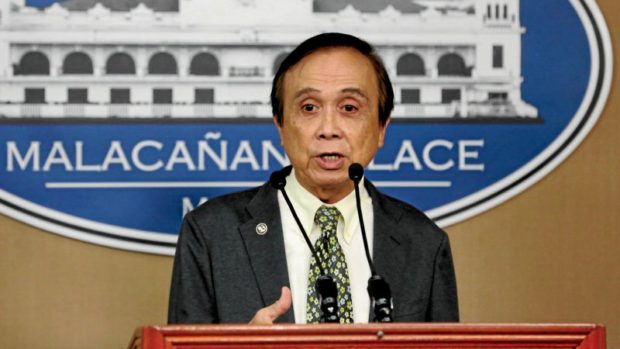
Socioeconomic Planning Secretary Ernesto M. Pernia (File photo by JOAN BONDOC / Philippine Daily Inquirer)
The government will rationalize the functions of state-run corporations such that they could no longer have commercial and regulatory mandates at the same time, Socioeconomic Planning Secretary Ernesto M. Pernia said.
Pernia, who heads the state planning agency National Economic and Development Authority, said last Friday that the review of the functions of government-owned and -controlled corporations (GOCCs) would be part of the crafting of a national competition policy this year.
For instance, Pernia noted that the National Food Authority (NFA) is both a regulator and a merchandiser given that it engages in commercial activity.
The NFA imports rice to keep local prices low while it also oversees traders.
For Pernia, there was a “conflict” when GOCCs performed a regulatory function and at the same time were players in the market.
Another GOCC with such conflict include the Philippine Ports Authority (PPA), which besides being a regulator also promotes the performance of ports, Pernia noted.
The same is true of Philippine Amusement and Gaming Corp. (Pagcor), which regulates casino operators and itself operates some gaming centers.
Pernia said that the functions of GOCCs would have to be defined.
“If the key purpose of the GOCC is to earn income, then it should be just earning income and not regulating. In other words, just drawing the line between commercial activity or proprietorship and regulation,” Pernia said.
The Neda chief said that this rationalization of GOCC functions should be done “right away because we are really anxious in getting the economy to sustain its performance and even accelerate.”
According to Pernia, the President could use moral suasion on the legislature to fast-track moves to clarify the respective mandates of GOCCs, which are instituted by law.
Last week, Neda said that the government would come out this year with a national competition policy, which will ensure, among others, a level playing field for state-run corporations as well as private firms.
The antitrust body Philippine Competition Commission will assist Neda in crafting the policy framework, which “will flesh out competition strategies in the country’s economic blueprint,” referring to the Philippine Development Plan (PDP) 2017-2022.
“These pillars are pro-competitive laws and regulations and government interventions, competitive neutrality, and enforcement of the Philippine Competition Act and other competition-related laws and issuances,” Neda said, referring to Republic Act No. 10667, the country’s comprehensive anti-trust law.
RA 10667 tasked Neda to draft the national competition policy with assistance from the quasi-judicial PCC.
“While the enactment of the Philippine Competition Act and the good work done by the PCC in implementing the law are steps in the right direction, we believe there is still a lot that needs to be done to deliver a level playing field for businesses and higher bargaining powers for consumers,” Neda Undersecretary Rosemarie G. Edillon said.

